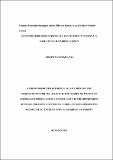| dc.description.abstract | The study focused on counterterrorism strategies and its effects in Kenya with a specific focus on Nairobi County. States (including Kenya), have endeavored to come up with appropriate strategies or measures that are internationally agreeable on counter terrorism. In the course of fighting terrorism, the right to life and safety of individuals’ human rights has faced increased challenges making counterterrorism efforts viewed as inappropriate. This study sheds light on existing counterterrorism strategies, their effects and specific challenges that surround the effort in counterterrorism. It was guided by three objectives; To establish the nature of counterterrorism measures in Kenya, to examine the effects of existing measures of counterterrorism in Kenya and finally to assess the challenges facing counterterrorism in Kenya. Two theories form the basis of this study; The political theory of anarchy that rejects any form of central authority on one hand; and the deprivation theory which shows that social behavior as in the case of terrorists, thrive where people feel denied or deprived what rightfully they deserve. The study was conducted in Nairobi County because it has the most experience of brunt of terror threats. A descriptive cross-sectional research design was adopted because data was collected at one point in time. The study targeted a population of 159 key officers who are tasked with the responsibility of counterterrorism operations. The officers were drawn from government agencies which included the Ministry of Foreign Affairs, Ministry of Interior and Coordination of National Government, Ministry of Defence, National Police Service, Kenya Prison Service, National Police Service, Judiciary, State Law Office and the Civil Society Organizations. A 30% sample size (48 respondents) was considered. Stratified random sampling was applied to come up with a proportionate number of respondents who were involved in handling terror suspects or involved in counterterrorism operations. The study relied on primary data which was collected using a semi-structured questionnaire containing both close-ended and open-ended questions. An interview guide was also used to obtain qualitative data from the respondents. Piloting was done using 8 respondents drawn from each of the agencies under study with a view of improving the data collection tools. Once collected, data was coded and entered in preparation for data analysis using the Statistical Package for Social Sciences Version 23 computer package. Descriptive statistics was used to analyze quantitative data while content analysis was used to analyze qualitative data. The study findings were presented in prose, tables and graphs. The study findings formed the basis for conclusions and recommendations. Research findings led to the conclusion that key strategies for combating terrorism in Kenya include but not limited to the following: Enactment of the anti-terrorism Act, educating the public, creation of income generating activities, arrests and prosecutions, ministerial pardons for terrorists on surrender, security forces fighting terrorism, multiagency approach, monitoring and intercept of money transactions and regulating the media. Key strategies for combating terrorism were generally effective. Generally, the various challenges identified were rated highly. The study recommended that: Historical injustices to be addressed, politics to be detached from tribes and security issues and embracing a multi agency approach in the fight against terrorism. Further research should be conducted to cover other Counties that were not covered in this research. Future research should also be conducted on the impact of counterterrorism strategies and Foreign Direct Investments in Kenya. | en_US |

